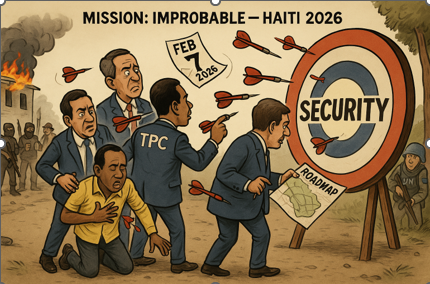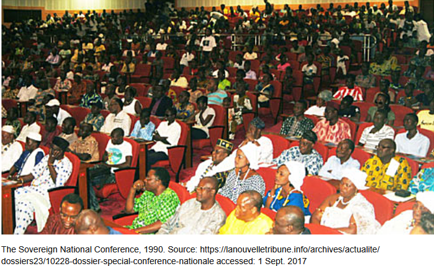Analyzing TPC’s failure to restore order in Haiti and the best way forward.
Stopping the degradation and closure of our last standing institutions: A case analysis.
Written by Team HAMREC
The opinions expressed in this article are based on the weekly discussions of the Haitian American Resources Committee members, a Haitian think tank.
TPC Member: "We’re ‘stabilizing’… just 10 more years!"
Gang Leader: "Keep talking, we’ll keep ruling."
Citizens: "Hello…? Anyone governing?"
In May 2024, Caricom, under pressure from powerful international actors, decided it would be in the best interest of every neighboring country to intervene and establish an interim government composed of significant political figures. The mission was straightforward: implement a security apparatus and collaborate with a provisional electoral council to organize the election before February 7, 2026.
Initially, the TPC presence worked primarily to stabilize the country and to keep the people off the streets. However, it has not succeeded in stopping organized criminals from gaining ground and claiming more territory to terrorize innocent people in the capital and some provinces. In the last few days, Haiti has witnessed the degradation of its remaining institutions. Hospitals are closing, and hotels, markets, and restaurants are no longer operating. It’s the perfect storm. Many are asking why Haitians should expect the current governing council to succeed.
The alternating chairmanship yields nothing but quiet cohabitation. Each term of chairmanship characterizes an increasing body count in the streets. The latest number of dead bodies due to gang activities is 4,500 since the council took the so-called “power.” Herein lies the problem: Do they have any power to drive the bandits out of the occupied areas? They have so far failed miserably and spectacularly.
One noticeable factor is the lack of power given to the individuals in charge. Haiti’s interim government is weak because real power lies with armed gangs, corrupt elites, and foreign actors who have no interest in a strong, independent Haitian state. In fact, to the credit of its current members, we must question whether the CARICOM masters ever wanted it to succeed. While some call this a conspiracy, it’s more accurate to say it’s a system of control built on decades of exploitation and violence. Until these power structures are dismantled, Haiti will remain trapped in crisis.
It would be disingenuous not to discuss what the current administration claims as an accomplishment. The Haitian Times reported some key achievements that the TPC made, including:
- Deployment of the Haitian Armed Forces (FAD’H) in Vertières, Northern Department.

- Increase police personnel and reinforcements from the Multinational Security Support Mission (MSS).
- Creation of the National Security Council.
- Formation of a Provisional Electoral Council after an eight-year delay.
- Reopening the port of Saint-Louis-du-Sud and expanding Jacmel and Les Cayes airports.
There is no national security council. Exorbitant salaries and benefits are directed towards making life more comfortable for the nine heads of state. Personal gains continue to persist. Murders and crimes have increased. Prisons are in ruins. The “intellectual authors” are not pursued. There is a lack of communication. There is no intelligence gathering on the ground.
Hearing TPC members say they are considering holding the general election outside the capital or suggesting that we let a Catholic saint intervene for us shows a lack of appetite for solid solutions to regain control of Port-au-Prince.
Kettia Taylor's article for Haitiinfospro.com sums it up better than I can: “The TPC today embodies a painful paradox: power without legitimacy, means without results, privileges without justification.”
The TPC's failure can easily be attributed to the fact that, like every prior administration, it has not communicated a clear plan to the people. Nor have they shown any interest in listening to people. They have never shown the public the root cause of the problem,
Problem
Kidlin’s law states that half the solution is already found if you clearly state the problem.
We continue to witness the degradation; the rapid descent into chaos endures. Essential institutions are either closed or gradually winding down their operations in Haiti. Yet, our so-called leaders continue to look the other way and pretend the situation is beyond their control. In contrast, they persist in paying themselves hefty salaries and other “fat” benefits monthly, in violation of Article 280 of the constitution. It’s no wonder that many Haitians still believe that Haiti is doing fine and that there is plenty of money in the country to provide services.
What approach is best suited to reclaiming the areas occupied by the gangs? What would be advisable to help the TPC move forward? What prevents the TPC and the previous government from increasing the number of enrollees to protect the nation and our cities?
Proposed Solutions
The Cynefin framework advises leaders to act, sense, and respond in the chaotic quadrant.
Is the TPC's weakness deliberate? Haitians in public forums and on social media believe the chaos is by design. Looking at the unfathomable inaction of the successive illegitimate transitional governing administration, the sum each member is getting paid makes one wonder if there is any rush to stop the cancer from spreading. On the ground, the TPC does not know or care about the real cause behind the escalation of criminal activities. As a result, every event will be unpredictable. This is where intelligence gathering is key. The framework recommends acting decisively and immediately to stabilize the situation. This also means that the gangs should not be allowed to continue recruiting and organizing, and further gains in territories should not be permitted. The action involves deploying additional security forces and enacting emergency measures. The stabilization phase requires full authority to implement new policies applicable and respected by every citizen.
Once the chaotic situation is stabilized and order is established, the political situation can move towards the "Complex" domain. This allows for a more nuanced understanding of the situation and the development of more sustainable solutions.
Keep focusing on securing the capital city.
Let's take a step back and analyze our current judicial and security apparatus and the jail infrastructure to hold the criminals. We should ask the following questions: How many police officers do we have? How much are they paid on average? What guarantees do they have for their respective families' safety when they go on dangerous missions searching for criminals?
A larger share of the national budget should be redirected to restore a semblance of security. At the same time, the remaining funds should focus on decentralization, resettlement housing, education, and healthcare. This breakdown does not provide an excuse to deny the population other vital services in the interim.
We often say that Haiti has the financial resources to accomplish many things. If that is true, now is the time to spend that money. If we ever need help from international actors, we could ask them to assist us in monitoring how the allocated funds are being disbursed to ensure transparency. Any data collected should be shared immediately with the public.
The council could commission a group to establish a six-month boot camp for 5,000 to 10,000 National police cadets off-site in a rural area. The soldiers would receive more formal training later and fully integrate into the national police forces.
Parallelly, the security forces already operating on the ground should be given a 20% wage increase.
The TPC could theoretically use a posse comitatus approach to suppress lawlessness, like the “bwa kale” movement. However, we have already analyzed the pitfalls. Mobilizing civilians to restore order requires a legal standing and operational framework that the country lacks. We must have enough jail space to house the ones that are caught alive.
Authentic Communication
Authentic leadership is about wanting the best for your followers. Sharing what you know, and sometimes, what you don’t know, shows respect for your people. A leader's worst mistake is failing to express their true intent and being determined to spin facts to show political correctness. Instead, it is always beneficial to be truthful with the public.
Social media can spread the word faster than any local newspaper. Use these platforms to communicate openly about the issues, potential solutions, and the collective effort needed to overcome them. A great leader’s values begin with honesty, integrity, and selfless acts.
Recommended Solution
Convene a Sovereign National Dialogue
Haitian elites, civil society, the diaspora, and marginalized groups, such as peasant organizations, have divergent visions for the country. At HAMREC, we all agreed that Haiti needs a National Conference to resolve its deep crises and chart a path toward stability, democracy, and development.
The term "Sovereign National Conference" refers to a historic political event in several African countries, particularly during periods of democratic transition or political upheaval. The concept emerged to unite diverse political, ethnic, religious, and civil society groups to discuss and negotiate the nation's future, often in response to authoritarian rule, military regimes, or profound societal divisions.
A National Dialogue broadens political participation and promotes inclusivity, allowing diverse interests to influence decisions. This is a meeting place for all sectors of national life and representatives of state power, public administration, the country's various geographical departments, and the diaspora to have a structured debate on all the country's structural, institutional, and cyclical crises with a view to a new social pact. The National Conference is promising.  Its dynamic vision and projection of the future could present Haiti differently.
Its dynamic vision and projection of the future could present Haiti differently.
A sovereign Haitian National Conference with a limited focus will be organized by and among Haitians. The very nature of its organization will give it this character. Better still, the resulting resolutions will be binding on the Haitian state and the Haitian people. We can start by forming an advisory circle that includes traditional wisdom, modern governance, and tech innovation. It will consist of a network of diaspora experts, local grassroots organizations (youth, women, and educators), and ethical media analysts.
Haitian thinkers and leaders are currently focused on making the national debate a reality. Chief among them is TikTok influencer and activist Patrick Pierre-Louis in France. There is also Jean Wilberson Timothée, the executive secretary of the Collective for the National Haitian Sovereign Conference (CNHS), and Claude Chouloute from the Haitian American Resources Committee. Even the TPC has spoken favorably about exploring the establishment of the project. However, it has not gained the traction that was expected. The late Dr. Turneb Delpe pioneered the idea of a Sovereign national conference in the 90s. Some people nicknamed him the “apostle of national debate,” while others called him “Mr. National Conference” before he died in 2017.
The success of a Sovereign National Conference (SNC) requires addressing political, legal, socioeconomic, and cultural challenges. It involves competencies and academic disciplines that can help analyze power structures, conflict resolution, and transitional justice. There must be a capacity to develop legal frameworks for post-conference legitimacy and governance. Anthropologists and sociologists will examine societal divisions and cultural narratives, while historians and media analysts will ensure a transparent and inclusive public discourse regarding postcolonial legacies. Other experts can assist with International Relations to manage external influences. More importantly, we will need psychologists to study the healing process of collective trauma for reconciliation, and educators to help with civics and ethics.
Expected Outcomes
A positive outcome involves a scenario favorable to a Progressive Consensus with a dominant center-left coalition providing social reforms, a limited foreign role, and anti-corruption drives.
- A well-defined roadmap for credible elections.
- A practical security plan.
- Enhanced coordination between the state and civil society.
*************-
Belizaire Vital, MD, MPA, DHA
Director of Policy Research and Analytics
Team HAMREC.